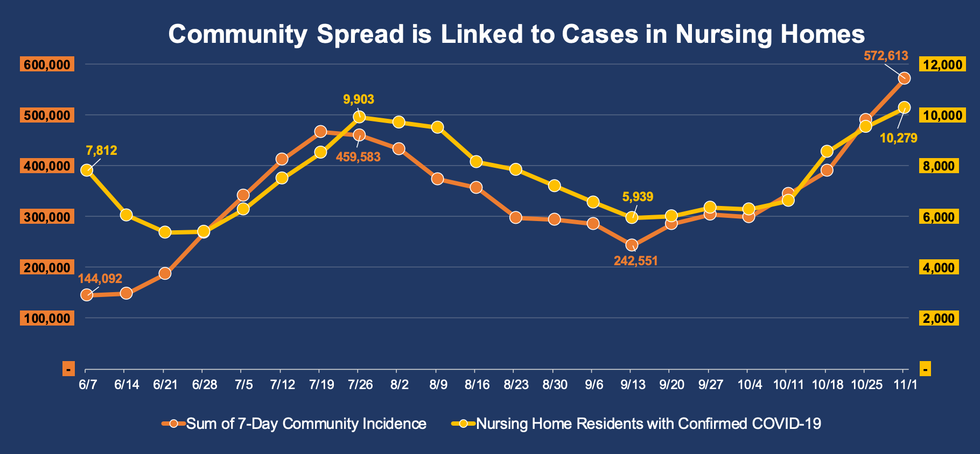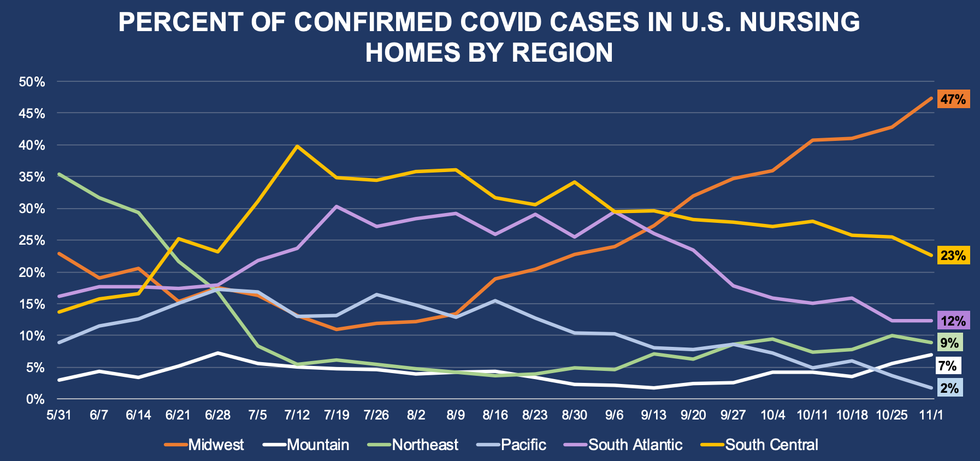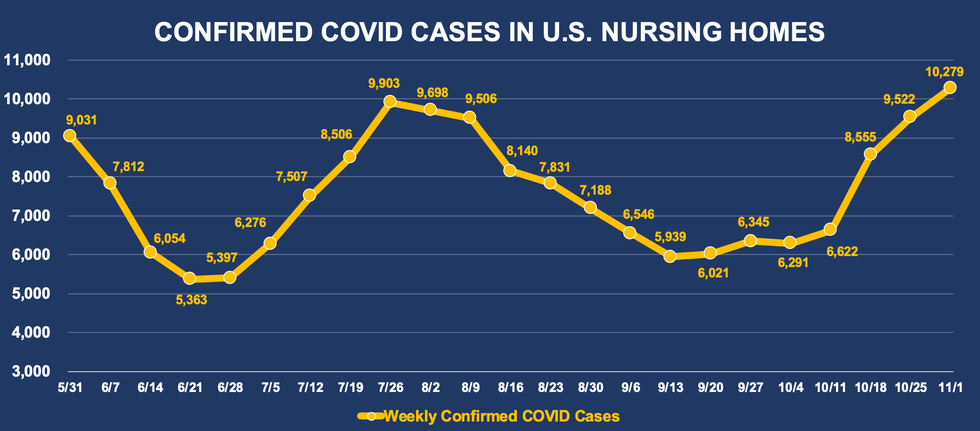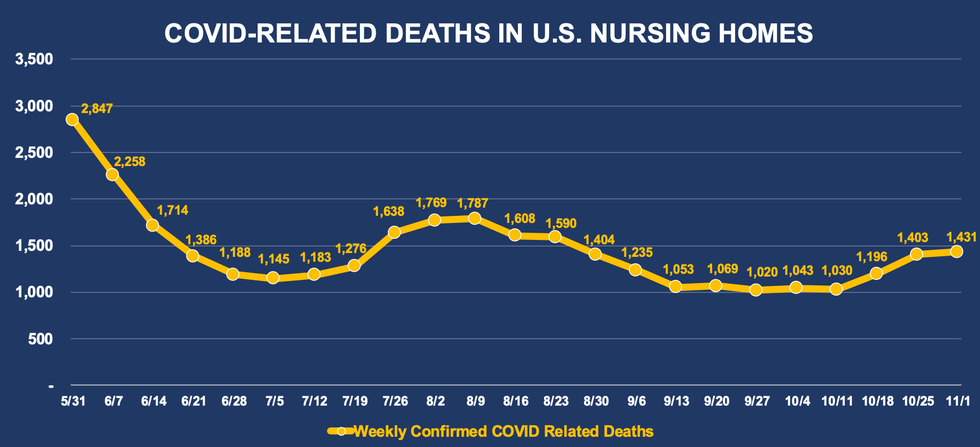November, 17 2020, 11:00pm EDT
Nursing Homes See Record Number Of New COVID Cases
Nearly 50% Of New Cases In Nursing Homes From Midwest States
WASHINGTON
The American Health Care Association and National Center for Assisted Living (AHCA/NCAL), representing more than 14,000 nursing homes and assisted living communities across the country that provide care to approximately five million people each year, released a report today showing new COVID cases in nursing homes in the U.S. has now reached a record number of weekly new cases this month due to the community spread among the general population, surpassing previous peaks since the Centers for Medicare & Medicaid Services (CMS) started tracking cases in nursing homes.
Recent data released by Johns Hopkins University and the Centers for Medicare & Medicaid Services (CMS) show that with the recent spike in new COVID cases in the general U.S. population, weekly nursing home cases are also on the rise. According to Johns Hopkins University, weekly new COVID cases in the general U.S. population rose by 140 percent to 572,613,527 new cases the week of November 1. A correlating uptick in new cases in nursing homes occurred when cases in the surrounding community started rising back in mid-September.
As experts have repeatedly noted, COVID-19 cases in a surrounding community is a top factor in outbreaks in nursing homes. University of Chicago's Tamara Konetzka, a nationally recognized expert on long-term care, recently said, "Trying to protect nursing home residents without controlling community spread is a losing battle." Dr. David Grabowski, professor of Health Care Policy, Harvard Medical School recently stated, "The strongest predictor of whether or not we'll see cases in [a particular setting] is community spread."
"Our worst fears have come true as COVID runs rampant among the general population, and long term care facilities are powerless to fully prevent it from entering due to its asymptomatic and pre-symptomatic spread," stated Mark Parkinson, President and CEO of AHCA/NCAL. "Our health care heroes are doing everything they can to prevent it from spreading further, but this level of COVID nationwide puts serious strain on our workforce, supplies, and testing capacity. If everybody would wear a mask and social distance to reduce the level of COVID in the community, we know we would dramatically reduce these rates in long term care facilities." (Video clip of AHCA/NCAL President/CEO Mark Parkinson's reaction to new report)
During the first week of November, nearly half (47 percent) of new COVID cases in nursing homes were from Midwest states with major spikes in community spread in the upper parts of the region. As a result, the Midwest region saw a 200 percent increase in weekly COVID cases in nursing homes since mid-September.
After seven weeks of declining cases in nursing homes through mid-September, nursing home cases began to increase as nearly all 50 states have started to see rising levels of COVID cases. New weekly cases in nursing homes grew by 73 percent nationwide between mid-September and the week of November 1.
The report also showed COVID-related deaths in nursing homes have risen slightly. Nursing home residents are typically older adults with multiple chronic conditions, making them most vulnerable to COVID-19. Residents of long term care facilities account for only eight percent of the nation's cases, yet 40 percent of its deaths. While mortality rates have decreased compared to the spring due to a better understanding of the virus, better treatments, and government resources to help reduce spread, industry leaders remain deeply concerned that the rising number of new COVID cases in facilities will ultimately lead to an increasing number of deaths.
"We are especially concerned that this situation will only get worse with Thanksgiving just around the corner," continued Parkinson. "The public must realize that their actions not only endanger our nation's most vulnerable, but also trigger government lockdowns of facilities, keeping these residents from their loved ones. This is detrimental to their health, wellbeing and happiness. We urge everyone to do their part to slow the spread immediately and exercise caution when celebrating Thanksgiving."
With rising new COVID cases across the country, Parkinson said Congress must prioritize frontline health care workers and long term care residents during the lame duck session. This week AHCA/NCAL released a list of actions that Congress should urgently take to help nursing homes and assisted living communities respond to the uptick in new cases.
Most of the $175 billion Provider Relief Fund provided by the CARES Act back in April has already been distributed and Parkinson said health care providers, including long term care facilities, will need additional funds to continue the response to the COVID pandemic heading into the cold and flu season. The financial aid is crucial in helping long term care facilities acquire personal protective equipment, conduct regular testing, and hire additional staff or reward current caregivers for their heroic efforts.
"Congress must fulfill its duty," stated Parkinson. "Without adequate funding and resources, the U.S. is repeating the same mistakes made during the initial outbreak last spring and the major spike over the summer. We need Congress to prioritize our vulnerable seniors and their caregivers in long term care facilities, by passing another COVID relief package during the lame duck session on Congress."
For more information, please visit www.ahcancal.org/coronavirus.
LATEST NEWS
'Win for Government Ethics' as George Santos Sentenced to 7 Years for Fraud
"Now more than ever, a commitment to transparency and accountability is key to ensuring that candidates and elected officials serve the public, not their own interests," said one campaign finance reform advocate.
Apr 25, 2025
Government ethics watchdogs on Friday said the sentencing of former Republican congressman George Santos to more than seven years in prison for fraud was a victory for "the many voters and donors who were deceived" by the disgraced lawmaker.
"Santos' brazen fraud and misconduct, which included serious violations of federal campaign finance laws, was an affront to his constituents, his donors, and the integrity of our democracy," said Saurav Ghosh, director of campaign finance reform at the Campaign Legal Center. "The fact that he was held accountable should speak loudly to anyone contemplating similar actions aimed at exploiting the democratic process for personal gain."
Santos received his 87-month sentence from U.S. District Judge Joanna Seybert in the Eastern District of New York eight months after he pleaded guilty to two felony counts and admitted to using his campaign fundraising operation for personal gain.
The former New York congressman, who flipped a blue seat in a Long Island district in 2022 and was charged by prosecutors just months later, admitted to submitting false reports to the Federal Election Commission, stealing financial and personal information from elderly and cognitively impaired donors to fraudulently charge their credit cards, and using campaign contributions for luxury shopping and a hotel room in Las Vegas.
"The robust enforcement of campaign finance and ethics laws is critical to ensuring that our democracy works for everyday Americans, not politicians' personal interests."
Seybert said during the sentencing that Santos had committed "flagrant thievery" during his brief political career.
He is required to report to prison by July 25 and was also ordered to pay more than $373,000 in restitution.
"This accountability for his pattern of unethical and illegal conduct is a win for government ethics," said Citizens for Responsibility and Ethics in Washington.
Ghosh praised "the diligent enforcement efforts of the Office of Congressional Ethics, which helped bring about this result."
"Now more than ever, a commitment to transparency and accountability is key to ensuring that candidates and elected officials serve the public, not their own interests," said Ghosh. "The robust enforcement of campaign finance and ethics laws is critical to ensuring that our democracy works for everyday Americans, not politicians' personal interests."
Keep ReadingShow Less
After Uproar, Trump Reverses on Mass Suspension of Student Visas
While the backtracking by the administration was welcome, one immigration expert warned people to "stay tuned for a round 2.0 of this."
Apr 25, 2025
This is a developing story... Please check back for possible updates...
A U.S. Department of Justice attorney told a federal court on Friday that the Trump administration will restore the visa status of thousands of foreign students after removing their information from a nationwide database, which led some universities to inform students that they must immediately self-deport and sparked numerous legal battles.
The Department of Homeland Security (DHS) terminated over 4,700 international students' records on the Student Exchange and Visitor Information System (SEVIS), which "sparked more than 100 lawsuits, with judges in more than 50 of the cases—spanning at least 23 states—ordering the administration to temporarily undo the actions," according toPolitco. "Dozens more judges seemed prepared to follow suit before Friday's reversal."
In a statement read aloud during a federal court hearing on Friday, Assistant U.S. Attorney Joseph Carilli explained that Immigration and Customs Enforcement (ICE) "is developing a policy that will provide a framework for SEVIS record terminations."
"Until such a policy is issued, the SEVIS records for plaintiff(s) in this case (and other similarly situated plaintiffs) will remain active or shall be reactivated if not currently active and ICE will not modify the record solely based on the NCIC finding that resulted in the recent SEVIS record termination," Carilli added, referring to the National Crime Information Center.
According toWUSA9's Jordan Fisher, Carilli also said the Department of Justice intends to file a similar statement in the other cases, but ICE reserves the right to terminate SEVIS records in the future based on student behavior.
The journalist added on social media that "I spoke with an attorney last night who said he's already talked to foreign students who left the U.S.—fearing they would be deported otherwise. This decision does not restore any canceled visas, and now they may face real difficulties returning."
Responding to the news on social media, American Immigration Council senior fellow Aaron Reichlin-Melnick said that "this is massive," but added this is "not the end" of the issue.
"ICE says it is going to develop a new policy to terminate SEVIS records legally in a way that aligns with their plans," he stressed. "So stay tuned for a round 2.0 of this—which would presumably be less chaotic, at the minimum."
Despite the development in the Washington, D.C. court, and the Justice Department's supposed plan to share its update with other courts across the country, some cases seem to be proceeding, at least for now.
Boston Globe reporter Steven Porter said on social media that he asked the ACLU of New Hampshire about the Friday statement, "(since they represent multiple plaintiffs whose SEVIS records were terminated), and legal director Gilles Bissonnette said they still don't know the nature or extent of these reversals."
"Bissonnette said the government hasn't given any indication that it intends to restore Dartmouth doctoral student Xiaotian Liu's student status absent an order from the court," so Liu still has 'an urgent and critical need' for immediate relief," Porter reported. "A federal judge in New Hampshire is likely to rule today on whether to grant a preliminary injunction in Liu's case. There is currently a temporary restraining order in place."
In addition to the SEVIS terminations, the Trump administration is targeting universities' federal funding as well as trying to deport several immigrants involved in campus protests against the U.S.-backed Israeli assault on the Gaza Strip, widely condemned as a genocide against Palestinians.
Keep ReadingShow Less
Slotkin Panned Online After Claiming That Voters Don't Know What 'Oligarchy' Means
"It's condescending to say that the median person doesn't understand what oligarchy is," said one progressive strategist. "They're living it."
Apr 25, 2025
U.S. Sen. Bernie Sanders' tour headlined with this word has drawn more than 107,000 Americans in blue and deep-red states alike. Former President Joe Biden's use of it in his farewell speech prompted a spike in Google searches. And one recent poll found that a majority of U.S. voters, including 54% of Democrats and more than two-thirds of Independents, know exactly what it means.
Yet Sen. Elissa Slotkin (D-Mich.) was among the Democratic politicians insisting this week that no one does.
The word is "oligarchy"—a government ruled by a small group of elites—and as experts have warned for years, the U.S. increasingly resembles one. As Sanders (I-Vt.) and Rep. Alexandria Ocasio-Cortez (D-N.Y.) have told huge crowds in places like Nampa, Idaho and Greeley, Colorado in recent weeks, President Donald Trump's alliance with billionaire tech mogul Elon Musk has made the country's shift even more obvious.
But even as evidence mounts that Americans understand that the political system has been captured by corporations and the wealthiest people—and are living their day-to-day lives with the results, including higher healthcare costs and disinvestment in public services—Slotkin toldPolitico on Thursday that Democrats should "stop using the term 'oligarchy,' a phrase she said doesn't resonate beyond coastal institutions."
On Bluesky, The Nation writer John Nichols said that the tens of thousands people who have packed stadiums and parks in recent weeks to hear Sanders and Ocasio-Cortez speak would disagree with Slotkin.
Michigan Senator Elissa Slotkin says Democrats should stop using the term "oligarchy" because, she says, no one knows what it means. These people say she’s wrong.
[image or embed]
— John Nichols (@nicholsuprising.bsky.social) April 24, 2025 at 8:00 PM
Slotkin's advice for Democrats, which she dubbed her "war plan" and gave ahead of several speeches she has planned, also included a call for the party to stop being "weak and woke," phrases she said she heard in Michigan focus groups.
Her comments echoed those of former Chicago Mayor Rahm Emanuel, a longtime Democratic operative who told California Gov. Gavin Newsom on his podcast last week that using terms like "oligarchs" and "special interests" makes Democrats "worse marketers"; Newsom appeared to agree that people don't "understand" what an oligarchy is.
Emanuel also appeared on the political and pop culture podcast "I've Had It," hosted by Jennifer Welch and Angie Sullivan, and seemed caught of guard when Welch took him to task for his suggestion that Democrats should end their advocacy for issues that affect transgender Americans.
"That is total bullshit, that is buying into the right-wing media narrative, and I'm so sick of Democrats like you selling out and saying this," said Welch. "You know who talks about trans people more than anybody? MAGA... We've got to fucking fight. They're the gender-obsessed weirdos, not us. We're the ones who fight for Social Security, we fight for Medicare, and yeah, we're not gonna bully trans people."
Semafor political reporter Dave Weigel said Emanuel's derision of the word "oligarchy" is a clear "shot at Sanders/AOC, who keep saying it."
At one stop on the Fighting Oligarchy Tour recently, Sanders told a crowd that the enthusiasm for his and Ocasio-Cortez's message is "scaring the hell out of" Trump and Musk.
But shortly after Slotkin's comments, Ocasio-Cortez remarked—without naming the senator—that "plenty of politicians on both sides of the aisle feel threatened by rising class consciousness."
Angelo Greco, a progressive strategist who works with grassroots organizations including Our Revolution and One Fair Wage, told Common Dreams on Friday that establishment Democrats' dismissal of the term oligarchy is "out of touch" and "underestimates" voters.
"Tell me that farmers don't understand what the oligarchy is when there's a consolidation of the agribusiness that impacts them. Tell me that workers in Michigan don't understand what it means when trade deals that are written by multinational corporations have led to lower wages and plant closures," said Greco. "It's condescending to say that the median person doesn't understand what oligarchy is. They're living it."
Keep ReadingShow Less
Most Popular






